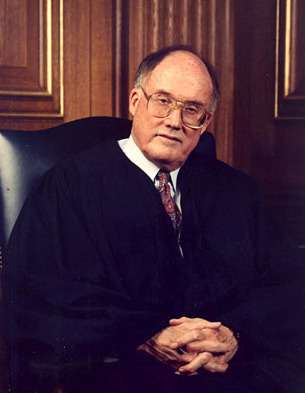The Volokh Conspiracy
Mostly law professors | Sometimes contrarian | Often libertarian | Always independent
Today in Supreme Court History: October 1, 1924
10/1/1924: Chief Justice Rehnquist's birthday.

Editor's Note: We invite comments and request that they be civil and on-topic. We do not moderate or assume any responsibility for comments, which are owned by the readers who post them. Comments do not represent the views of Reason.com or Reason Foundation. We reserve the right to delete any comment for any reason at any time. Comments may only be edited within 5 minutes of posting. Report abuses.
Please to post comments


Y'all hear qui tam is unconstitutional now?
The wages of the 1990s 'Constitution in Amber' originalism are unpredictable, impracticable, and certainly not fixity of the law!
Any reason for this seemingly random comment?
This, presumably:
https://fcablog.sidley.com/2024/10/01/district-court-rules-fca-qui-tam-provision-unconstitutional/
I am also curious as to what Sarcastr0 has heard.
Perhaps this?
https://www.arnoldporter.com/en/perspectives/blogs/fca-qui-notes/posts/2024/09/one-small-step-for-a-district-court
So, William Rehnquist and Jimmy Carter were born on the same day. Interesting.
One was a bigger gift to the human race than the other.
Hey, I know Hustler Magazine v. Falwell was a landmark decision, but you may be overrating Rehnquist here.
Yes, one was a decent judge. The other is history's greatest monster.
Both statements are funny because they're so absurdly contrary to reality.
Bob's trolling. His comment is too stupid for even him to believe.
The second part is a Simpson's joke, old man.
I thought the killer rabbit was the greatest monster.
OT, but compare Jimmy Carter, publicly admitting in that Playboy interview that he has occasionally lusted after women in his heart, with Trump, who boasted about grabbing their p*****s.
United States v. Peck, 102 U.S. 64 (decided October 1, 1880): parol evidence (i.e., evidence outside the four corners of the contract) admissible to show that contract for providing wood and hay to army contemplated that hay would be cut in the area (supplier was unable to do that and government had others provide it from far away and charged him for the extra expense)
United States v. Carll, 105 U.S. 611 (decided October 1, 1881): can’t convict someone passing a counterfeit currency when the indictment didn’t mention that he knew it was counterfeit
The Supreme Judicial Court of Massachusetts recently reversed a conviction for uttering a forged instrument because the evidence did not sufficiently prove knowledge by the defendant. She cashed a check that had been stolen possibly three weeks earlier. If the check had been stolen three days earlier then traditional presumptions of guilty knowledge related to recently stolen property would apply. After three weeks the prosecution needed something more. Like the handwriting comparison that was argued for the first time on appeal. Commonwealth v. Oliver, SJC-13486.
Which doesn’t really have anything to do with the Supreme Court case: the issue wasn’t the sufficiency of the evidence of knowledge, but rather the sufficient of the indictment given that it didn’t explicitly allege knowledge.
When Chief Justice Rehnquist died in 2005, he was the first justice to die in office since Justice Robert Jackson in 1954. While justices' dying in office has become a relative rarity as time has gone on, due largely to medical advance leading to longer lifespans and more generous pensions, chief justices have historically died on the bench. Of our sixteen former chief justices, nine have died in office. (Chief Justice Taft died one month after retiring from the Court). Only four Chiefs have voluntarily stepped down in relatively good physical and mental health: Jay, Hughes, Warren, and Burger.
Garcia Glen White is scheduled to die later today. Final appeals are pending. There are likely to be miscellaneous orders later today dismissing them without comment. I think a bit of comment, especially when justices think the execution should not occur, is warranted.
https://ballsandstrikes.org/legal-culture/marcellus-williams-supreme-court-death-penalty/
Rehnquist was one of Brian Lamb’s interviews:
https://booknotes.c-span.org/Watch/26896-1
Brian Lamb was one of the best interviewers. He asked some simple questions and just let his guests talk.
He murdered five people, got to live almost 30 years longer than he should have, and presented a patently frivolous emergency brief. A single sentence denial is an act of incredibly merciful generosity.
Wow, Brian Lamb wasn't as nice as I had thought!
Well, he was in that film, Silence of the Lamb.
When listening to oral arguments from around 1980, Rehnquist's voice from time to time sounds slurred. It might be from medicine he took to deal with his back problems.
https://www.reuters.com/article/world/fbi-files-detail-rehnquist-drug-addiction-wpost-idUSN04222522/
Rehnquist was strongly conservative, including in the 1960s (voting rights), and during the Nixon Administration. He later became much more of a median vote on the Supreme Court, after once nicknamed the "lone ranger" for his dissents.
Liberal justices appreciated him personally, including his ability to carry out the official duties of the Chief Justice, as compared to Warren Burger. He was more laid back and famously (infamously) wore stripes on his robe from his love (like Ainsley Hayes) of Gilbert and Sullivan.
I argued before SCOTUS in 1991. During moot court preparations with more experienced litigators (I was four years out of law school at the time) I was told not to be unnerved if Chief Justice Rehnquist got up to walk around during the argument.
During the Clinton impeachment, while presiding, he said that he might have to get up and stretch.
I remember those stripes from the Clinton impeachment trial. I didn't realize he did it other times. At least he didn't go full John Jay.